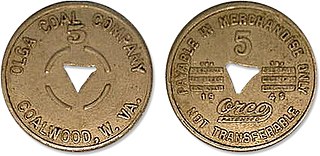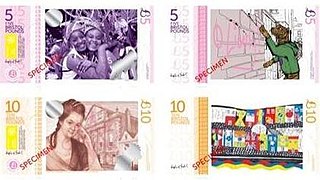A currency is a standardization of money in any form, in use or circulation as a medium of exchange, for example banknotes and coins. A more general definition is that a currency is a system of money in common use within a specific environment over time, especially for people in a nation state. Under this definition, the British Pound sterling (£), euros (€), Japanese yen (¥), and U.S. dollars (US$) are examples of (government-issued) fiat currencies. Currencies may act as stores of value and be traded between nations in foreign exchange markets, which determine the relative values of the different currencies. Currencies in this sense are either chosen by users or decreed by governments, and each type has limited boundaries of acceptance; i.e., legal tender laws may require a particular unit of account for payments to government agencies.

Workers' compensation or workers' comp is a form of insurance providing wage replacement and medical benefits to employees injured in the course of employment in exchange for mandatory relinquishment of the employee's right to sue his or her employer for the tort of negligence. The trade-off between assured, limited coverage and lack of recourse outside the worker compensation system is known as "the compensation bargain.” One of the problems that the compensation bargain solved is the problem of employers becoming insolvent as a result of high damage awards. The system of collective liability was created to prevent that and thus to ensure security of compensation to the workers.

Employment is a relationship between two parties regulating the provision of paid labour services. Usually based on a contract, one party, the employer, which might be a corporation, a not-for-profit organization, a co-operative, or any other entity, pays the other, the employee, in return for carrying out assigned work. Employees work in return for wages, which can be paid on the basis of an hourly rate, by piecework or an annual salary, depending on the type of work an employee does, the prevailing conditions of the sector and the bargaining power between the parties. Employees in some sectors may receive gratuities, bonus payments or stock options. In some types of employment, employees may receive benefits in addition to payment. Benefits may include health insurance, housing, and disability insurance. Employment is typically governed by employment laws, organization or legal contracts.

Goodwill Industries International Inc., or simply Goodwill, is an American business that provides job training, employment placement services and other community-based programs for people who face barriers in their employment.

A wage is payment made by an employer to an employee for work done in a specific period of time. Some examples of wage payments include compensatory payments such as minimum wage, prevailing wage, and yearly bonuses, and remunerative payments such as prizes and tip payouts. Wages are part of the expenses that are involved in running a business. It is an obligation to the employee regardless of the profitability of the company.

A salary is a form of periodic payment from an employer to an employee, which may be specified in an employment contract. It is contrasted with piece wages, where each job, hour or other unit is paid separately, rather than on a periodic basis. Salary can also be considered as the cost of hiring and keeping human resources for corporate operations, and is hence referred to as personnel expense or salary expense. In accounting, salaries are recorded in payroll accounts.

A scrip is any substitute for legal tender. It is often a form of credit. Scrips have been created and used for a variety of reasons, including exploitative payment of employees under truck systems; or for use in local commerce at times when regular currency was unavailable, for example in remote coal towns, military bases, ships on long voyages, or occupied countries in wartime. Besides company scrip, other forms of scrip include land scrip, vouchers, token coins such as subway tokens, IOUs, arcade tokens and tickets, and points on some credit cards.
Labour power is the capacity to do work, a key concept used by Karl Marx in his critique of capitalist political economy. Marx distinguished between the capacity to do work, i.e. labour power, and the physical act of working, i.e. labour. Labour power exists in any kind of society, but on what terms it is traded or combined with means of production to produce goods and services has historically varied greatly.

A company store is a retail store selling a limited range of food, clothing and daily necessities to employees of a company. It is typical of a company town in a remote area where virtually everyone is employed by one firm, such as a coal mine. In a company town, the housing is owned by the company but there may be independent stores there or nearby.
Equal pay for equal work is the concept of labour rights that individuals in the same workplace be given equal pay. It is most commonly used in the context of sexual discrimination, in relation to the gender pay gap. Equal pay relates to the full range of payments and benefits, including basic pay, non-salary payments, bonuses and allowances. Some countries have moved faster than others in addressing equal pay.
Welfare capitalism is capitalism that includes social welfare policies and/or the practice of businesses providing welfare services to their employees. Welfare capitalism in this second sense, or industrial paternalism, was centered on industries that employed skilled labor and peaked in the mid-20th century.
The Cincinnati Time Store (1827–1830) was the first in a series of retail stores created by American individualist anarchist Josiah Warren to test his economic labor theory of value. The experimental store operated from May 18, 1827, until May 1830. He sold things at-cost plus a small markup for his time. It is usually considered to be the first time alternative currency labor notes were used, and as such the first experiment in what would later be called mutualism. He also founded stores in New Harmony, Indiana, and at Modern Times, Long Island. The store in Cincinnati closed in 1830 with Warren being satisfied he demonstrated running and managing a business without the "erection of any power over the individual". His theory — replacing money with time — was turned into an actual practical demonstration project. It was the first such activity, preceding similar labor notes in Europe by more than 20 years, and still has implications for other concepts of currency such as cryptocurrencies. Nonetheless, at the time it was the most popular mercantile institution in Cincinnati.
Truck Acts is the name given to legislation that outlaws truck systems, which are also known as "company store" systems, commonly leading to debt bondage. In England and Wales such laws date back to the 15th century.

Company scrip is scrip issued by a company to pay its employees. It can only be exchanged in company stores owned by the employers. In the United Kingdom, such truck systems have long been formally outlawed under the Truck Acts. In the United States, payment in scrip became illegal in 1938 as part of the Fair Labor Standards Act.
The degree of labour market flexibility is the speed with which labour markets adapt to fluctuations and changes in society, the economy or production. This entails enabling labour markets to reach a continuous equilibrium determined by the intersection of the demand and supply curves.

Money is any item or verifiable record that is generally accepted as payment for goods and services and repayment of debts, such as taxes, in a particular country or socio-economic context. The primary functions which distinguish money are: medium of exchange, a unit of account, a store of value and sometimes, a standard of deferred payment.

The Bristol pound (£B) was a form of local, complementary, and/or community currency launched in Bristol, UK on 19 September 2012. Its objective was to encourage people to spend their money with local, independent businesses in Bristol, and for those businesses to in turn localise their own supply chains. At the point of the close of the digital scheme in August 2020, it was the largest alternative in the UK to official sterling currency, and was backed by sterling.
The Wära was a demurrage-charged currency used in Germany introduced in 1926 as a free economy experiment. It was introduced by Hans Timm and Helmut Rödiger, who were followers of Silvio Gesell. The Wära is comparable to current models of local currencies.
In Russia, from the second half of the 19th to the early 20th century limited means of payment got rather widespread among private individuals - owners of commercial firms, shop owners, owners of profitable outlets at clubs. Sometimes the use of surrogate money resulted in a temporary shortage of state paper bills of small denominations and small coins in some region of the country. But most often the initiators of such unofficial emissions were the desire to get a more concrete economic benefit, for example, when bons that were paid instead of usual wage went then to purchase goods in a trade points organized by the same entrepreneurs.

Godcharles v. Wigeman, 113 Pa. 431 (1886), was a decision of the Supreme Court of Pennsylvania recognizing a freedom of contract between employers and their employees that state legislators were powerless to regulate. Specifically, this case struck down a state law requiring wages to be paid in cash.










